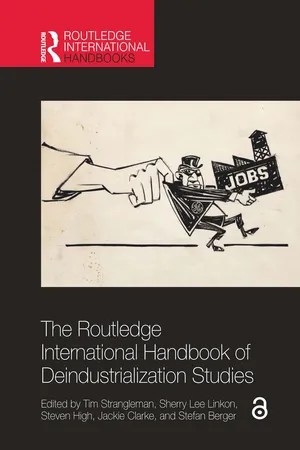
The Routledge International Handbook of Deindustrialization Studies
- 536 pages
- English
- ePUB (mobile friendly)
- Available on iOS & Android
The Routledge International Handbook of Deindustrialization Studies
About this book
The Routledge International Handbook of Deindustrialization Studies is a timely volume that provides an overview of this interdisciplinary field that emerged in response to the widespread decline of manufacturing and heavy industry from the 1980s onward. Edited by prominent figures in the field, the volume brings together many of the leading scholars from a range of countries across the globe to offer a multifaceted overview of deindustrialization and its impact.
Deindustrialization has been cited as one of the factors behind the rise of the far right, and to a lesser extent the far left, across Europe, the rise and success of Trumpism in the US, and the Brexit vote as well as the more recent and sudden erosion of UK Labour's 'Red Wall' of the North of England. This collection brings together scholars of deindustrialization around the globe and from a wide variety of academic disciplines including history, sociology, politics, geography, economics, anthropology, literature, arts practice, photography, heritage, and cultural studies. In doing so, the volume explores the roots of deindustrialization across the world, highlights the key themes and issues in the field, illustrates the intersectional and interdisciplinary character of the field, and shows how deindustrialization lies at the heart of many of the key political, cultural, social, and economic issues of our time.
Written in a clear and accessible style, the Handbook is a comprehensive interdisciplinary volume for this young but maturing field. The volume is a valuable resource for students, teachers, and researchers interested in industrial decline, closure, and the multifaceted impacts they cause. It speaks to readers across the arts, humanities, and social and political sciences concerned with deindustrialization broadly defined.
Chapter 27 of this book is freely available as a downloadable Open Access PDF at http://www.taylorfrancis.com under a Creative Commons [Attribution-Non Commercial-No Derivatives (CC-BY-NC-ND)] 4.0 International license.
Frequently asked questions
- Essential is ideal for learners and professionals who enjoy exploring a wide range of subjects. Access the Essential Library with 800,000+ trusted titles and best-sellers across business, personal growth, and the humanities. Includes unlimited reading time and Standard Read Aloud voice.
- Complete: Perfect for advanced learners and researchers needing full, unrestricted access. Unlock 1.4M+ books across hundreds of subjects, including academic and specialized titles. The Complete Plan also includes advanced features like Premium Read Aloud and Research Assistant.
Please note we cannot support devices running on iOS 13 and Android 7 or earlier. Learn more about using the app.
Table of contents
- Cover
- Half Title
- Title Page
- Copyright Page
- Table of Contents
- List of Figures
- List of Tables
- List of Contributors
- Acknowledgments
- Introduction
- Part I Concepts and Theories
- Part II Political Economy of Deindustrialization
- Part III Communities, Identities, Affects
- Part IV The Critical Cultural Work of Representations
- Part V Memories, Memorialization, and the Heritage of Deindustrialization
- Conclusion
- Index